Top 9 Inbound Call Center Providers in 2026

A survey showed that about 32% of consumers said they would stop doing business with a brand after just one bad customer service experience. And often, that first interaction comes through a phone call.
This is why inbound call center service providers have become so important.
While it might seem like a small piece of a much larger puzzle, inbound customer support is at the heart of building loyalty, resolving issues efficiently, and giving your brand a human touch. Every call counts, and missing or mishandling a single inquiry can mean missed revenue, lost trust, or churn.
In this article, we’ll walk you through the 9 best inbound call center service providers for 2025, highlighting their key features, pricing, and best-fit scenarios.
Let’s dive into what inbound call center services are, why they matter more than ever, and which providers are leading the way this year.
Key takeaways:
- They help businesses handle incoming calls efficiently, resolve issues quickly, and deliver a more human, personalized support experience that builds trust and loyalty.
- With features like intelligent routing, IVR, and real-time analytics, inbound call platforms help teams respond faster, reduce wait times, and improve customer and agent satisfaction.
- From startups to large enterprises, each inbound call center solution offers unique pricing, features, and flexibility, so it’s essential to select one that aligns with your size and goals.
- Platforms that connect with your CRM and existing tools ensure smoother operations, faster onboarding, and a quicker return on investment.
Boost Retention with Intelligent Call Routing
What Are Inbound Call Center Services?
Inbound call center software is designed to help businesses manage and improve their handling of incoming customer calls. It connects callers to the right person, provides agents with the necessary information, and helps teams resolve issues more efficiently.
This type of software becomes essential for companies receiving a high volume of daily calls. It can route calls automatically, track key metrics, record conversations for quality purposes, and generate reports to help improve overall performance.
Unlike outbound call tools, which are built for sales or outreach, inbound software focuses on support. It’s meant for teams that help customers who reach out with questions, concerns, or requests, and it plays a big role in shaping the customer experience.
9 Best Inbound Call Center Solutions
When choosing the right inbound call software, there are plenty of options to explore. Each also comes with different pricing models, features, and support levels. Here’s a quick overview of the top 9 solutions to consider for 2025.
Provider
Starting Price
Free Trial
IVR
Reporting & Analytics
Call Recording
CloudTalk
Contact for pricing
14 days
Yes
Yes
Yes
NICE CXone
Contact for pricing
60 days
Yes
Yes
Yes
RingCentral
$20/user/month
14 days
Yes
Yes
Yes
Five9
$149/user/month
Unavailable
Yes
Yes
Yes
Zoho Desk
$14/user/month
15 days
No
Yes
Yes
Aircall
$30/license/month
7 days
Yes
Yes
Yes
Genesys Cloud
$75/month
30 days
Yes
Yes
Yes
Twilio Flex
$1/user/hour
5,000 free hours
Yes
Yes
Yes
8×8
Contact for pricing
Unavailable
Yes
Yes
Yes
1. CloudTalk
CloudTalk is a next-generation VoIP solution that has earned a spot in G2’s Best Software Awards 2024. Designed for sales and support teams, it offers over 70 advanced calling features, making it an industry leader in customer communication.
What CloudTalk Offers
CloudTalk excels with AI-powered analytics, smart dialing, and seamless integrations, making it the best choice for businesses optimizing communication. It offers award-winning VoIP, global numbers, CRM integration, and scalability for all businesses.
Here are CloudTalk’s key features:
- Call Flow Designer: Automate call routing and IVR for seamless customer experiences
- Power Dialer & Smart Dialer: Boost agent productivity with automated dialing sequences
- AI Speech Analytics: Get real-time insights into call sentiment and keyword tracking
- Call Recording & Monitoring: Train teams with recorded calls and live listening
- WhatsApp & SMS Messaging: Connect with customers via multiple channels
What Makes CloudTalk Stand Out?
Unlike many other providers on the market, CloudTalk excels in features, usability, and reliability.
- Better Call Quality: International calls maintain crystal-clear audio
- Faster Setup & Deployment: Go live in minutes with an intuitive UI
- No Hidden Fees: Transparent pricing with no surprise add-ons
- Scalability & Flexibility: Grows with your business, whether small or enterprise
- 24/7 Customer Support: Always available to assist, unlike many competitors
What Type of Business Is It Best for?
CloudTalk is perfect for businesses of all sizes looking for a powerful, AI-driven phone system. Whether you run a call center, sales team, or customer support department, CloudTalk enhances communication, increases efficiency, and drives revenue.H4: CloudTalk’s Pricing
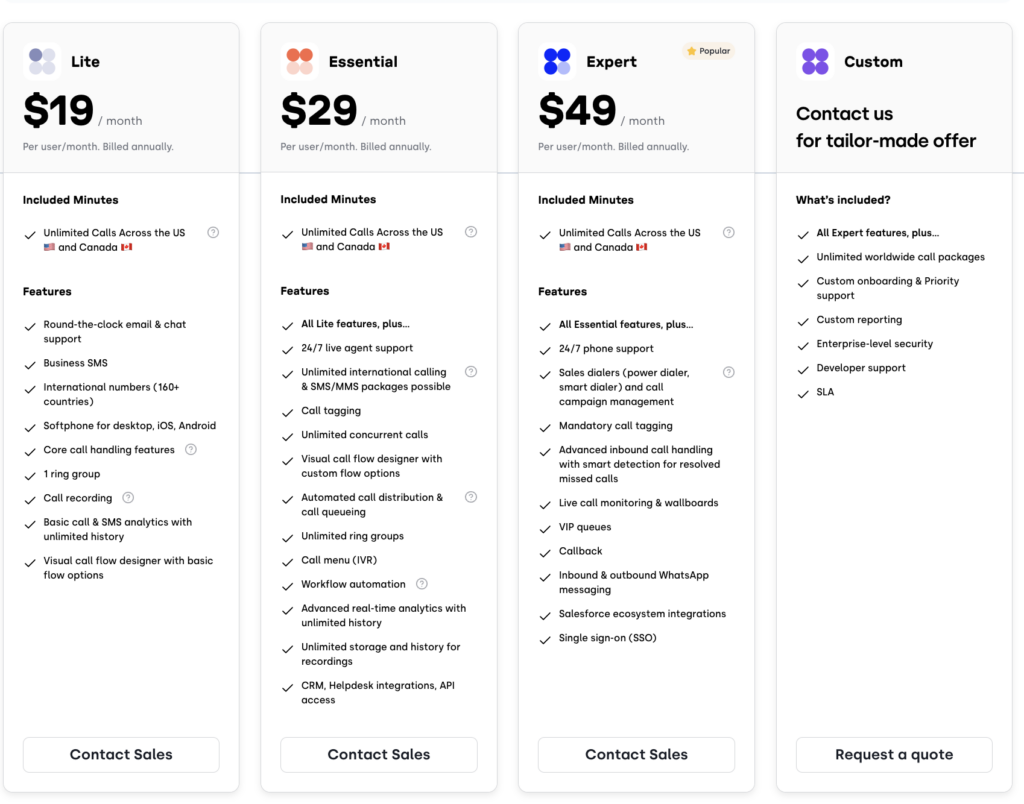
Looking for an inbound contact center solution? Take a self-guided, interactive tour and see how the platform works at your own pace.
2. RingCentral
RingCentral is a well-established cloud communication platform offering voice, messaging, and video solutions. Known for its reliability and ease of use, it’s a popular choice for teams needing a scalable and integrated inbound call center solution.
RingCentral’s advantages
RingCentral combines robust calling features with CRM integrations, which makes it easy for support teams to stay efficient and responsive. It supports omnichannel workflows, call analytics, and IVR, all within an intuitive dashboard.
It also offers:
- IVR & Call Routing: Guide callers to the right departments automatically
- Call Recording & Monitoring: Improve training and maintain call quality
- Analytics & Reporting: Track call volume, agent performance, and wait times
- Custom Greetings & Call Queues: Tailor the experience for incoming callers
- CRM Integrations: Seamlessly connect with tools like Salesforce and HubSpot
What Is RingCentral Missing?
Looking for the best of inbound cloud contact center providers? This might not be it. Some users report occasional call quality issues and application lag. Advanced AI features and predictive dialers are limited compared to newer platforms.
What Type of Business Is It Best for?
Ideal for small to mid-sized teams looking for a reliable, plug-and-play solution with strong CRM integrations and a familiar UI.
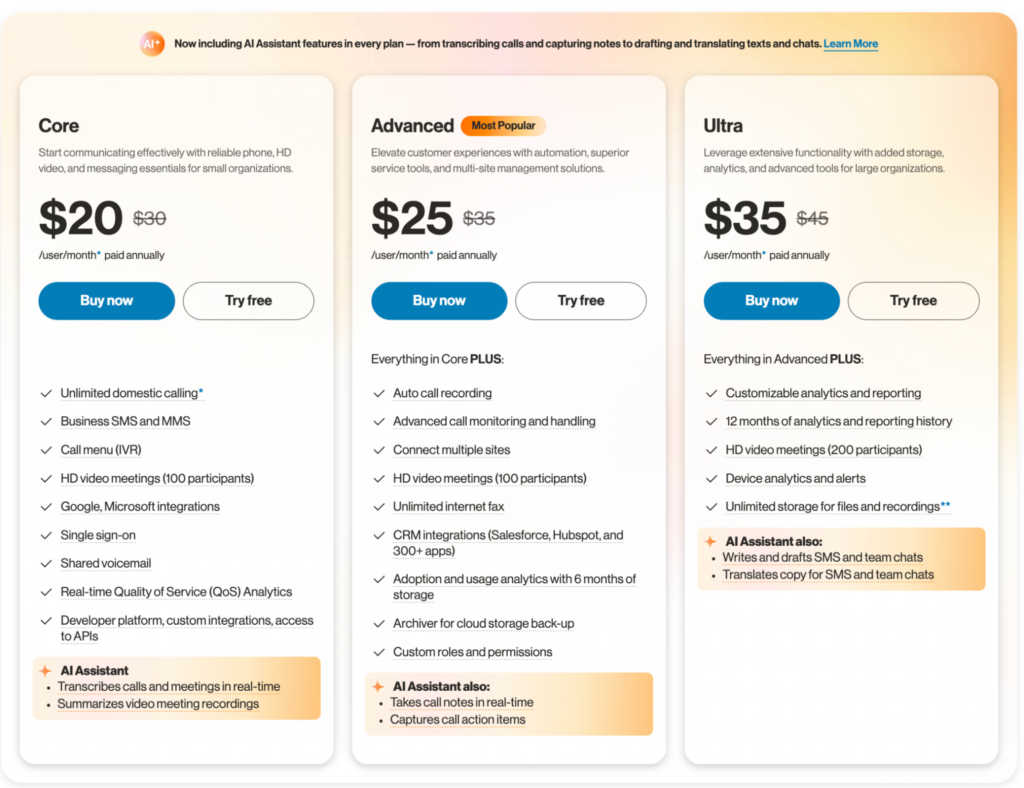
3. Five9
Five9 is a powerful, enterprise-grade contact center platform built for companies that need high customization and deep functionality. It’s widely used in industries like finance, healthcare, and retail.
Five9’s Benefits
With a comprehensive toolset for routing, agent management, and reporting, Five9 is designed to support complex workflows at scale. Its AI-powered features help streamline service and improve productivity across teams.
Five9’s top features include:
- Real-Time Dashboards: Track performance and KPIs live
- Embedded Voice & Monitoring: Listen, whisper, or barge into live calls
- Workforce Management: Forecast staffing needs and manage agent schedules
What Is Five9 Missing?
Five9’s learning curve can be steep, and pricing is on the higher end. It may be too complex for smaller teams or businesses without a dedicated IT department.
What Type of Business Is It Best for?
Best for large businesses or enterprises with complex support operations and the resources to take full advantage of Five9’s advanced tools.

4. NICE CXone
NICE CXone is a cloud-based contact center platform built for enterprises that want to deliver consistent, intelligent customer experiences across channels.
NICE CXone’s Benefits
NICE CXone combines robust contact center infrastructure with advanced AI tools. It supports seamless routing, real-time monitoring, and workforce optimization—ideal for teams managing large call volumes and complex workflows.
This platform also offers:
- IVR & Call Routing: Direct calls based on skills or customer data
- Reporting & Analytics: Deep insights into team performance and call outcomes
- Call Recording & Monitoring: Ensure quality and train teams effectively
- Customized Greetings: Personalize customer interactions
- Workforce Management: Forecast demand, schedule agents, and reduce idle time
What Is NICE CXone Missing?
While powerful, NICE CXone’s platform is more complex to set up and can feel overwhelming for smaller teams. Pricing is also not publicly listed and may be cost-prohibitive for SMBs.
What Type of Business Is It Best for?
Best suited for large enterprises or organizations with highly specialized support needs that require deep customization and AI-powered optimization.

5. Zoho
Zoho is a cloud-based help desk platform that includes inbound call handling as part of its broader customer support suite. It’s known for being budget-friendly, especially for growing teams already using the Zoho ecosystem.
Zoho’s Benefits
Zoho Desk centralizes customer support across channels, including phone, email, and chat. While more focused on help desk functionality, it offers essential inbound call features with strong automation and reporting tools.
The top features Zoho offers are:
- Call Logging & History: Keep track of every interaction with detailed records
- Custom Workflows: Automate ticket routing and follow-up tasks
- Reporting & Dashboards: Monitor agent performance and customer satisfaction
- Embedded Voice: Handle inbound calls from within the help desk interface
- CRM Integration: Seamlessly connects with Zoho CRM and other tools
What Is Zoho Missing?
It lacks advanced voice features like IVR and predictive dialing. It’s more of a ticketing system with call add-ons than a full-fledged call center platform.
What Type of Business Is It Best for?
Ideal for small businesses and support teams already using Zoho products, looking for a cost-effective way to handle inbound queries across channels.

6. Aircall
Aircall is a VoIP platform built for support and sales teams that want a clean, modern interface and powerful integration capabilities. It’s especially popular with remote-first businesses and fast-scaling startups.
Aircall’s Benefits
Aircall provides real-time call monitoring, collaborative features like shared inboxes, and seamless CRM integrations. Its intuitive setup and user-friendly dashboard help teams hit the ground running.
Top features of Aircall include:
- Click-to-Dial from CRM: Initiate calls directly from tools like HubSpot or Salesforce
- Live Call Monitoring: Supervisors can join or listen to calls for quality control
- IVR & Call Queues: Route calls based on availability or caller intent
- Analytics Dashboard: View team performance and call trends in real time
- Over 100 Integrations: Connect with CRMs, help desks, and collaboration tools
What Is Aircall Missing?
Aircall’s pricing may be a hurdle for small teams. It also lacks advanced AI features and predictive dialing, which are useful for high-volume operations.
What Type of Business Is It Best for?
Best for mid-sized companies or SaaS teams that prioritize user experience and need fast, scalable inbound support with strong integrations.
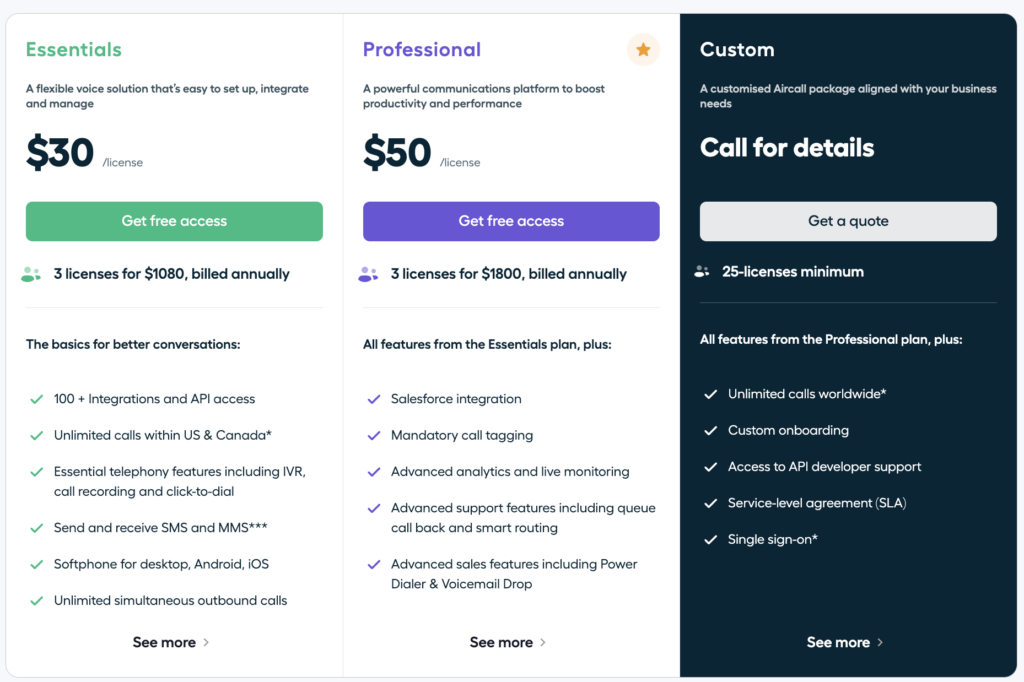
7. Genesys Cloud
Genesys Cloud is a feature-rich contact center platform known for its scalability and deep AI capabilities. Built for businesses that need omnichannel customer engagement, it supports everything from inbound calls to chat, email, and social messaging.
Genesys Cloud’s Benefits
Genesys Cloud delivers consistent customer experiences with advanced tools for call routing, analytics, and workforce management. Its all-in-one interface and global scalability make it a strong fit for growing or enterprise-level teams.
Genesys Cloud’s key features include:
- Omnichannel Routing: Handle voice, email, chat, and social in one platform
- IVR & Auto-Attendant: Customize call flows based on caller input or data
- Real-Time & Historical Reporting: Track performance at both the agent and team level
- Call Recording & Monitoring: Improve training and quality assurance
- Workforce Management (WFM): Forecast demand and schedule staff effectively
What Is Genesys Cloud Missing?
While powerful, it may be overkill for smaller teams. Some users report limited Salesforce integration depth and a steeper learning curve during setup.
What Type of Business Is It Best for?
Best for mid-sized to large organizations in industries like finance, healthcare, and government that need reliable omnichannel support and robust analytics.
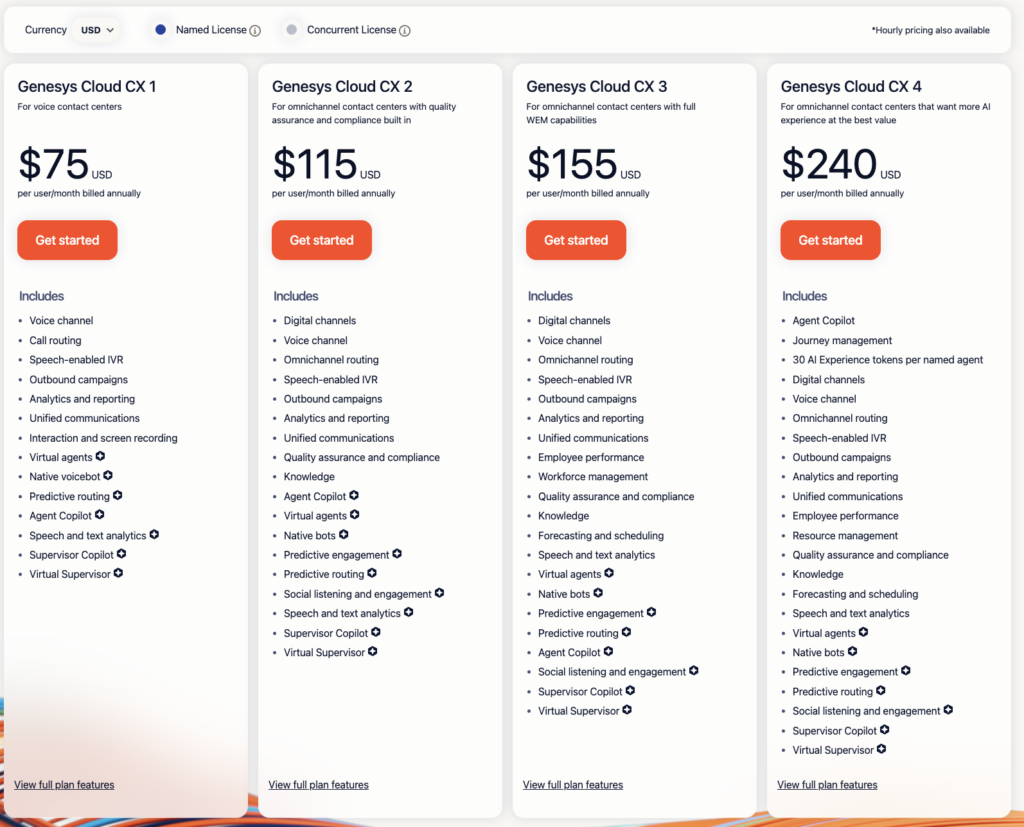
8. Twilio Flex
Twilio Flex is a highly customizable cloud contact center platform designed for developers and teams that want full control over their customer experience. Built on the Twilio infrastructure, it offers unmatched flexibility.
Twilio Flex’s Benefits
Twilio Flex allows businesses to tailor every aspect of their contact center, from the UI to routing logic. It integrates seamlessly with existing systems and scales easily as teams grow or needs evolve.
The top advantages this platform offers include:
- Programmable IVR & Routing: Fully customizable call flows using Twilio Studio
- Voice, Chat, SMS, WhatsApp Support: Engage customers across multiple channels
- Real-Time Reporting Dashboards: Visualize contact center performance at a glance
- Call Recording & Monitoring: Stay compliant and maintain call quality
- 5,000 Free Hours: Generous trial for testing or MVP builds
What Is Twilio Flex Missing?
Flex requires technical expertise to implement and maintain, making it less accessible for teams without developer resources. Out-of-the-box functionality is limited compared to plug-and-play solutions.
What Type of Business Is It Best for?
Ideal for tech-savvy teams and enterprises that need custom solutions and have the in-house resources to build and manage them.
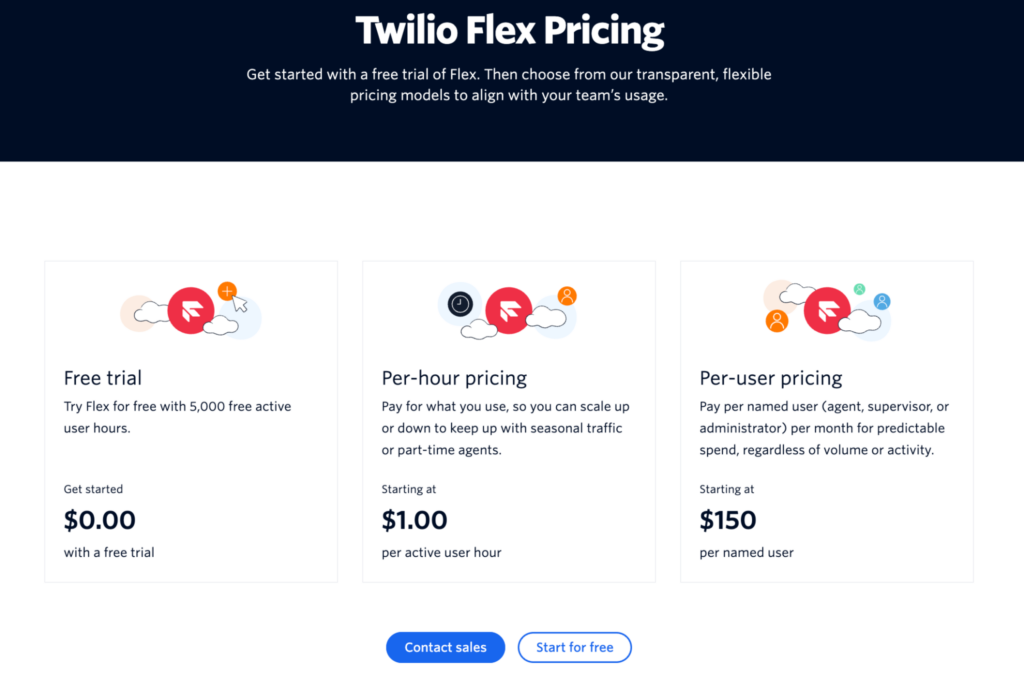
9. 8×8 Dialer
8×8 is a unified communications platform offering voice, video, chat, and contact center tools in one system. It’s built for businesses that want to consolidate communication while still having access to powerful inbound call handling features.
8×8’s Benefits
8×8 combines cloud-based telephony with contact center capabilities, offering strong global coverage, built-in analytics, and CRM integrations. It’s known for its enterprise-grade security and reliable performance across channels.
This platform’s top features include:
- IVR & Advanced Call Routing: Direct calls efficiently based on caller input or logic
- Call Recording & Monitoring: Log conversations for training and compliance
- Reporting & Analytics: Track key metrics and service levels in real time
- Embedded Voice: Handle calls directly within popular CRMs
- Workforce Management (WFM): Plan staffing, manage queues, and optimize schedules
What Is 8×8 Missing?
8×8 lacks a virtual receptionist feature and offers only basic Salesforce integration. Some users find it less customizable compared to more modern platforms like Twilio or Genesys.
What Type of Business Is It Best for?
Best for SMBs and mid-sized enterprises that want an all-in-one communication solution with solid contact center features and global support.
For all tiers, users are required to contact for pricing.
Why Having a Specialized Inbound Call Center Platform Is Important
As customer expectations rise, having the right tools to manage inbound communication becomes essential. A specialized inbound call center platform can significantly affect how efficiently and effectively your team supports customers, especially at scale.
- Manage high call volumes with less effort: Inbound software helps route calls automatically, cutting down on wait times and reducing the need for manual handling of routine requests.
- Free up agents to focus on high-value interactions: With built-in tools like IVR and self-service options, customers can resolve simple issues on their own, allowing agents to focus on more complex cases.
- Maintain consistency across every channel: A unified platform lets your team handle voice, chat, video, and even social channels from one place, ensuring a smoother, more consistent customer experience.
- Improve training and performance with better visibility: Features like real-time call monitoring, scorecards, and call recordings help managers coach more effectively and maintain service quality.
See how smarter inbound call handling can improve efficiency, boost customer satisfaction, and simplify your team’s workflow.
Essential Features for Inbound Call Center Services
Not all call center platforms are created equal. To provide fast, personalized, and effective customer service, your inbound call center software should include a set of essential features that support both your agents and your customers.
Interactive Voice Response (IVR)
An IVR system helps customers navigate support by guiding them through automated voice menus. This reduces call wait times and frees up agents by routing simple queries or scheduling callbacks without human involvement.
Smart Call Routing
Call routing ensures that incoming calls are sent to the right agent or department based on customer needs. Whether it’s based on skills, availability, or time of day, intelligent routing improves efficiency and reduces customer frustration.
Workforce Management (WFM)
WFM tools help managers forecast call volumes, schedule agents, and adjust staffing in real time. This is crucial for keeping service levels high without over- or under-staffing your team.
Omnichannel Capabilities
Customers expect support beyond phone calls. Omnichannel tools let agents manage conversations across voice, email, live chat, and even social media from a single interface.
Reporting & Analytics
Analytics dashboards help you understand team performance, customer satisfaction, and call trends. Look for tools that track metrics like call resolution time, wait time, and agent productivity to improve your operations continuously.
How to Pick the Best Inbound Call Center Platform
Choosing the right inbound call center software is about finding a solution that fits your workflow, supports your team, and delivers long-term value. Here are five key questions to ask before making a decision:
- Will this platform integrate easily with the tools we already use?
Compatibility with your current CRM, help desk, and other business systems ensures a smoother rollout and minimizes disruption. - How does the software handle sensitive customer data?
Look for security certifications, data encryption standards, and compliance with privacy regulations like GDPR or HIPAA. - Is the platform easy for agents and admins to learn and use?
A clean, intuitive interface can significantly reduce onboarding time and prevent performance dips during transition. - What is the actual long-term cost of using this tool?
Beyond subscription fees, consider implementation, training, maintenance, and the cost of scaling up as your business grows. - How quickly can we start seeing results after implementation?
Time to value matters—opt for solutions with fast setup, clear onboarding steps, and measurable impact early on. - Does it support the communication channels our customers prefer?
Depending on where your customers are, choose a platform that supports not just voice but also chat, email, SMS, or social media. - Can we customize it to match our workflows and team structure?
Flexibility is important. Check if the platform allows you to tailor routing, reporting, agent roles, and other settings to your needs. - What kind of support will we get post-purchase?
Consider whether the provider offers 24/7 support, a knowledge base, training resources, or dedicated account management. - Is there built-in reporting to help us track performance?
You’ll want analytics highlighting trends, agent metrics, and customer satisfaction without needing third-party tools.
CloudTalk: The Smarter Call Center Choice
Running a contact center shouldn’t mean juggling confusing pricing models or relying on developers to get started.
CloudTalk keeps it simple: powerful features, clear costs, and no surprises. It’s designed for teams that want to move fast, stay efficient, and grow without wasting time or budget.
Here’s what you avoid with CloudTalk:
- No massive setup fees
- No developer-heavy onboarding
- No per-minute call costs
- No extra charges for phone numbers
- No unexpected overages at the end of the month
All the essentials, none of the complexity. Just a platform that works—and works with you.
Discover how easy it is to run your contact center with CloudTalk
Source:












